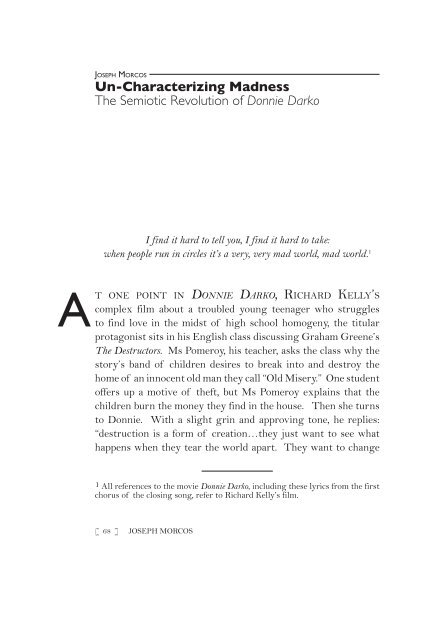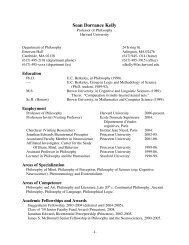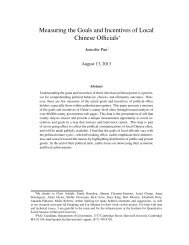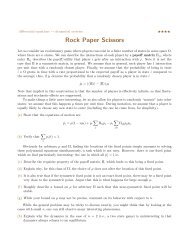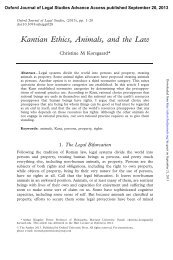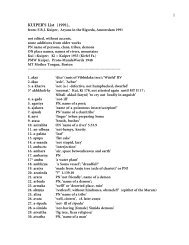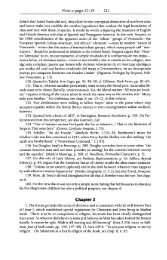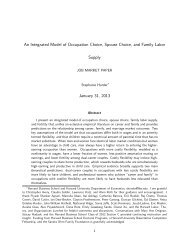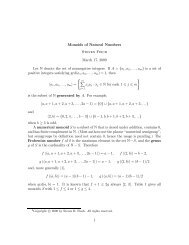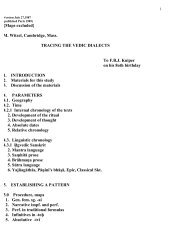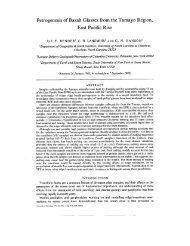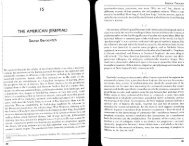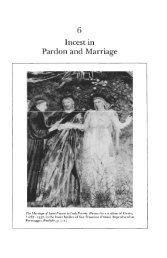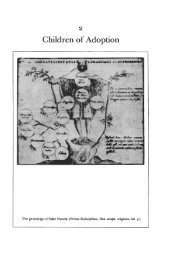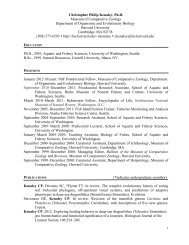Un-Characterizing Madness The Semiotic Revolution of Donnie Darko
Un-Characterizing Madness The Semiotic Revolution of Donnie Darko
Un-Characterizing Madness The Semiotic Revolution of Donnie Darko
You also want an ePaper? Increase the reach of your titles
YUMPU automatically turns print PDFs into web optimized ePapers that Google loves.
A<br />
Jo s e P h mo r c o s<br />
<strong>Un</strong>-<strong>Characterizing</strong> <strong>Madness</strong><br />
<strong>The</strong> <strong>Semiotic</strong> <strong>Revolution</strong> <strong>of</strong> <strong>Donnie</strong> <strong>Darko</strong><br />
I find it hard to tell you, I find it hard to take:<br />
when people run in circles it’s a very, very mad world, mad world. 1<br />
t o n e p o i n t in do n n i E da r k o, ri c h a r d ke l ly’s<br />
complex film about a troubled young teenager who struggles<br />
to find love in the midst <strong>of</strong> high school homogeny, the titular<br />
protagonist sits in his English class discussing Graham Greene’s<br />
<strong>The</strong> Destructors. Ms Pomeroy, his teacher, asks the class why the<br />
story’s band <strong>of</strong> children desires to break into and destroy the<br />
home <strong>of</strong> an innocent old man they call “Old Misery.” One student<br />
<strong>of</strong>fers up a motive <strong>of</strong> theft, but Ms Pomeroy explains that the<br />
children burn the money they find in the house. <strong>The</strong>n she turns<br />
to <strong>Donnie</strong>. With a slight grin and approving tone, he replies:<br />
“destruction is a form <strong>of</strong> creation…they just want to see what<br />
happens when they tear the world apart. <strong>The</strong>y want to change<br />
1 All references to the movie <strong>Donnie</strong> <strong>Darko</strong>, including these lyrics from the first<br />
chorus <strong>of</strong> the closing song, refer to Richard Kelly’s film.<br />
[ 68 ] JOSEPH MORCOS
things.” <strong>Donnie</strong>’s understanding <strong>of</strong> <strong>The</strong> Destructors goes not to its<br />
characters’ criminal act, but rather to the way its characters might<br />
alter the crime’s significance – destruction becomes creation. In<br />
one sense, <strong>Donnie</strong>’s reading <strong>of</strong> the story acknowledges that the<br />
arson cannot govern its own semantic significance. This model,<br />
by which <strong>Donnie</strong> claims the very meaning attached to the arson,<br />
not only helps define <strong>Donnie</strong>’s character but also speaks to Kelly’s<br />
film at large, in which the troubled youth must negotiate a wide<br />
gamut <strong>of</strong> institutional pressures in order to carve out a personal<br />
sense <strong>of</strong> the world.<br />
But this scene in <strong>Donnie</strong> <strong>Darko</strong> speaks equally to the larger<br />
issue <strong>of</strong> semiotics, or the experience <strong>of</strong> meaning, and its relation<br />
to society. <strong>The</strong> film addresses a society’s regulation <strong>of</strong> meaning<br />
and how an individual, like <strong>Donnie</strong>, might lead a revolution<br />
against these semiological constructs. <strong>Donnie</strong>’s quest in the film<br />
does not pit him against individuals per se, but rather against<br />
frameworks <strong>of</strong> how meaning should operate – those imposed<br />
structures that attempt, as Els Van Dongen might understand<br />
<strong>Donnie</strong>, to rob him <strong>of</strong> his “personal world <strong>of</strong> significations” (1).<br />
Though not dealing specifically with <strong>Darko</strong>, Dongen prompts a<br />
deeper consideration <strong>of</strong> meaning amid the potential madness that<br />
tinges the film. <strong>The</strong> question for psychiatrists like Dongen is the<br />
moment in which this “personal world <strong>of</strong> significations” devolves<br />
into madness. Says Dongen: “psychotic people are thought to<br />
have access to a world <strong>of</strong> meaning that remains locked to others”<br />
(1). As <strong>Donnie</strong> upends the authoritarian prompts <strong>of</strong> language,<br />
teachers, and celebrity therapists, he may seem to be mad; indeed,<br />
he seems to reject the very laws <strong>of</strong> the cosmos. But, following<br />
<strong>Donnie</strong>’s upheavals <strong>of</strong> expectation, he might claim himself to<br />
be simply living among madness – hence his understanding <strong>of</strong><br />
arson as an act <strong>of</strong> creation. Perhaps the most revolutionary claim<br />
UN-CHARACTERIZING MADNESS [ 69 ]
I<br />
<strong>of</strong> <strong>Donnie</strong> <strong>Darko</strong> is <strong>Donnie</strong>’s assertion that it is an individual’s<br />
ability – duty even – to disturb the normative meanings attached<br />
to societal prompts. In this sense, the debate over madness can be<br />
re-signified as a debate over duty. Shed <strong>of</strong> societal prompts, the<br />
individual can construct a personally desired sense <strong>of</strong> significance<br />
from the surrounding world, not because he is mad, but because<br />
he must. For <strong>Donnie</strong>, it is a matter <strong>of</strong> survival.<br />
s o l at i o n o f t h e f i l m’s s e m i o l o g i c a l c l a i m s, o r h o w m E a n i n g<br />
functions, is certainly not an easy task; one must first lay aside<br />
<strong>Darko</strong>’s slippery plotlines, endless cultural references, and<br />
tangled chronology. But even then, how does one begin to<br />
discuss the film’s wealth <strong>of</strong> semiological exclamations? <strong>The</strong><br />
human sciences employ a convenient philological vocabulary<br />
to articulate, in this instance, <strong>Donnie</strong>’s personal understanding<br />
<strong>of</strong> arson, but this philological vocabulary also applies to any<br />
society-created system that allows for such an upheaval, or<br />
“transfer,” <strong>of</strong> meaning. In other words, the technical discussion<br />
<strong>of</strong> language becomes a model for the general examination <strong>of</strong> the<br />
human sense <strong>of</strong> significance. Language, therefore, is not limited<br />
to the conventions <strong>of</strong> words, but can be applied likewise to events<br />
that hold significance. As presented by linguist Ferdinand de<br />
Saussure, the foundational claim holds that in language there<br />
exists an inherent division between the event <strong>of</strong> language (what<br />
might be understood as the act <strong>of</strong> arson in the Destructors) and<br />
its attached meaning (how <strong>Donnie</strong> interprets that arson as an<br />
act <strong>of</strong> creation). Saussure labeled these events and meanings<br />
“signifier” and “signified,” respectively, in which they form pairs<br />
(“signs”) for the sake <strong>of</strong> meaning. Saussure makes the radical<br />
claim that, however counterintuitive, it is the signifier that limits<br />
and defines the signified; he argues, essentially, that language<br />
[ 70 ] JOSEPH MORCOS
controls meaning. <strong>The</strong> nebulous, uncontrollable urges and<br />
formless thoughts contained within the human psyche – the<br />
savage, socially untouched sense <strong>of</strong> meaning – is actually under<br />
the power <strong>of</strong> arbitrarily invented societal prompts.<br />
<strong>The</strong> film’s disreputable pop-therapy master, Jim<br />
Cunningham, provides an example <strong>of</strong> Saussure’s claim that<br />
language controls meaning. Throughout the film Cunningham<br />
preaches the self-help binary “fear vs. love,” and believes <strong>Donnie</strong><br />
is “controlled by fear.” In doing so, Cunningham assumes that<br />
there is a distinct human emotion clearly aligned with “fear.”<br />
<strong>The</strong> pop-therapy master understands a segment <strong>of</strong> meaning to<br />
be aligned succinctly with a certain resulting linguistic signifier,<br />
the word “fear.” Saussure, though, would assert the opposite:<br />
it is Cunningham’s use <strong>of</strong> “fear” that defines what it means.<br />
Language for Saussure is not a simple “nomenclature” that works<br />
to articulate preexisting structures <strong>of</strong> meaning. Rather it is the<br />
empty word that manages to divide and imply a certain signified<br />
– those emotions associated with fear, fright, and terror. This<br />
tidy package <strong>of</strong> signifier and subjugated meaning form Saussure’s<br />
sign. And again, Saussure would argue that <strong>Donnie</strong>’s emotions<br />
result from certain combinations <strong>of</strong> prompts and randomly<br />
assigned significance. “<strong>The</strong> bond between signifier and signified,”<br />
for Saussure, “is arbitrary” (788). What <strong>Donnie</strong> shows us, then,<br />
is that the relationship between signifier and signified is not only<br />
arbitrary, but alterable. In other words, where Saussure shows<br />
us that the genesis <strong>of</strong> meaning is arbitrary but to some degree<br />
socially determined, <strong>Donnie</strong> shows us that meaning continues to<br />
be a calculus <strong>of</strong> signification. For <strong>Donnie</strong>, even after the signifier is<br />
arbitrarily assigned to the signified, meaning continues to change.<br />
<strong>The</strong> state <strong>of</strong> “fear” that Cunningham so adamantly opposes does<br />
not, in fact, preexist its word. <strong>Donnie</strong> aims throughout the film<br />
UN-CHARACTERIZING MADNESS [ 71 ]
to overthrow this linguistic opposition.<br />
“Fear and love,” the “lifeline” Cunningham devises to map the<br />
human psyche, cannot, then, be “the deepest <strong>of</strong> human emotions.”<br />
Embracing the construct, Mrs. Farmer, Cunningham’s dedicated<br />
supporter, imposes the binary upon the students <strong>of</strong> Middlesex<br />
High; they are told that every scenario – every action – merits<br />
placement on Cunningham’s fear vs. love “spectrum.” <strong>Donnie</strong>,<br />
though, realizes that such a binary exists not to reflect upon<br />
the truth <strong>of</strong> human emotion (“life isn’t that simple,” he objects),<br />
but rather to limit and sterilize something nebulous and utterly<br />
unstructured (he accuses Mrs. Farmer <strong>of</strong> ignoring “the whole<br />
spectrum <strong>of</strong> human emotion”). But, as Mrs. Farmer at one point<br />
unintentionally implies, there is nothing intrinsically meaningful in<br />
the “fear” and “love” signifiers – their power comes simply because<br />
“the lifeline is divided that way.” <strong>The</strong>orist Tor Hernes would<br />
describe these prompts <strong>of</strong> fear and love as “mere labels, loose<br />
prescriptions or elaborate models” (49). Or, as Dongen might<br />
have it, the students performing this “lifeline” exercise “have no<br />
medium <strong>of</strong> expression other than that defined by culture, and<br />
therefore are expected to abide by the means provided” (5). In<br />
refusing to participate in Mrs. Farmer’s exercise and exposing to<br />
the school the absurdity <strong>of</strong> Cunningham’s binary, <strong>Donnie</strong> rejects<br />
the imposition <strong>of</strong> linguistic structure; he refuses to “abide by the<br />
means provided.” For him, the meaning contained in the endless<br />
sea <strong>of</strong> human emotion is far too great and infinitely complex to<br />
be reduced to two linguistic signifiers.<br />
In this example, Kelly’s film encourages a resistance to<br />
these impositions (the viewer clearly sides with <strong>Donnie</strong> over the<br />
administration), but has not yet provided a solution to this linguistic<br />
problem. How, then, can one escape and overcome the totalitarian<br />
rule <strong>of</strong> the linguistic signifier over the human experience <strong>of</strong><br />
[ 72 ] JOSEPH MORCOS
meaning? <strong>Donnie</strong> <strong>Darko</strong> provides countless examples <strong>of</strong> these<br />
private rebellions, these personal revolts against culturally fixed<br />
structures. Essentially, the semiological revolution involves<br />
a constant re-signification <strong>of</strong> these structured signifiers. <strong>The</strong><br />
language remains; it is only the normatively associated meaning<br />
that is reconsidered. Claude Lévi-Strauss and Jacques Derrida,<br />
who applied Saussure’s theory <strong>of</strong> linguistics to anthropology and<br />
philosophy (respectively), supplement Saussure’s vocabulary with<br />
the term “bricolage,” French for “tinkering.” <strong>The</strong>ir focus on the<br />
social and cultural manifestations <strong>of</strong> Saussure’s ideas, particularly<br />
the bricoleur, aid a discussion <strong>of</strong> rebellion and revolutionaries, like<br />
<strong>Donnie</strong>, who individually appropriate established forms to create<br />
a desired sense <strong>of</strong> meaning. For Derrida, “[t]he bricoleur…is<br />
someone who uses ‘the means at hand,’ that is, the instruments<br />
he finds at his disposition around him…not hesitating to change<br />
them whenever it appears necessary” (1210). This bricoleur<br />
therefore assumes that “meanings are not given unalterably in<br />
advance, but can be changed” (Belsey 89).<br />
It is this same bricolage that makes its appearance in <strong>Donnie</strong>’s<br />
English class: the burning <strong>of</strong> Old Misery’s house is clearly<br />
the signifying event, and its conventional meaning <strong>of</strong> sadness,<br />
desolation and reduction its signified. Here, the viewer finds<br />
something unexpected: <strong>Donnie</strong> turns destruction into a kind <strong>of</strong><br />
creative bounty. <strong>The</strong> sign in this case, the act <strong>of</strong> destruction<br />
and its normatively negative implications, is not a concrete<br />
pairing <strong>of</strong> signifier and signified. Like <strong>Donnie</strong>, one can “tinker”<br />
with meaning; the beautiful and creative can be posited into a<br />
signifier as seemingly destructive as the burning <strong>of</strong> a blameless<br />
gentleman’s home. For <strong>Donnie</strong>, not only is the Saussurian sign<br />
arbitrary at its inception–it remains arbitrary at every moment <strong>of</strong><br />
its inscription. This concept <strong>of</strong> bricolage, however, is not tolerated<br />
UN-CHARACTERIZING MADNESS [ 73 ]
T<br />
by the Middlesex administration and its despotic prescription<br />
<strong>of</strong> meaning; Mrs. Farmer attempts (and, in the deleted scenes 2 ,<br />
succeeds) to ban Greene’s story. <strong>The</strong> revolutionary <strong>Donnie</strong>,<br />
though, grins as Greene’s destructors appropriate for themselves<br />
the meaning associated with their crime.<br />
This bricolage, or the insistence upon creating varied and<br />
desirable sensations <strong>of</strong> meaning, translates past hypothetical<br />
book discussions and into the most acutely personal moments<br />
<strong>of</strong> <strong>Donnie</strong>’s life. Even in the seconds following the death <strong>of</strong> his<br />
love interest, <strong>Donnie</strong> refuses the event’s imposing “signified.”<br />
In only about three nightmarish minutes, <strong>Donnie</strong> and Gretchen<br />
are assaulted at knife-point by the school’s bullies; Gretchen is<br />
thrown violently to the ground, and is hit by a car. <strong>Donnie</strong> then<br />
murders the car’s driver with a gunshot to the eye. Considering<br />
the event in strictly linguistic terms, with the two deaths and<br />
overwhelming tragedy as signifier, one is tempted to read the<br />
scene with a sense <strong>of</strong> anguish, fear, and terror. Shockingly, then,<br />
comes <strong>Donnie</strong>’s response. He tells the surviving passenger in<br />
the vehicle to “Go home and tell your parents that everything’s<br />
gonna be okay!” It seems an unlikely outcome, but <strong>Donnie</strong> refuses<br />
to surrender to anything likely, and particularly to expectations<br />
<strong>of</strong> meaning. He refuses to allow for sorrow because, in his mind,<br />
sorrow is only arbitrarily attached to death.<br />
h e v i e w e r s o o n f i n d s t h at do n n i e is n o t t h e o n ly b r i C o L E u r,<br />
and in this sense the film begins to take a more resolute stance<br />
in terms <strong>of</strong> madness – perhaps it is the world that is mad, not<br />
the individual. Gretchen serves as a particularly pronounced<br />
2 “Deleted scenes” refers to the scenes only included in the “Bonus Features:<br />
Scenes” menu <strong>of</strong> the cited DVD in its original version.<br />
[ 74 ] JOSEPH MORCOS
example; she continually fights against signifiers working to<br />
impose certain sensations <strong>of</strong> meaning – events that seem to<br />
demand a natural resulting signified <strong>of</strong> pain or terror. <strong>The</strong>se<br />
signifiers can be adjusted to create a personally desired signified<br />
– the linguistic sign must be remembered as arbitrary and<br />
therefore alterable. Gretchen’s tendency, like <strong>Donnie</strong>’s, is to<br />
carve out moments <strong>of</strong> beauty in her life by rejecting impositions<br />
<strong>of</strong> meaning . <strong>The</strong> viewer witnesses this when the young girl is<br />
verbally attacked. <strong>The</strong> same bullies who are partly responsible<br />
for her death a few scenes later expose to the entire class the<br />
secret <strong>of</strong> her tragic past: Gretchen is on the run from a father<br />
who attempted to murder her mother. <strong>The</strong> cruel students jeer<br />
and mock until Gretchen flees the building, crushed. <strong>Donnie</strong><br />
runs behind to assure her wellbeing; they meet outside, and<br />
without letting <strong>Donnie</strong> finish his sentence, Gretchen begins to<br />
forcefully, fervently kiss him for the first time. <strong>The</strong> viewer is<br />
surprised, though, for <strong>Donnie</strong> had been denied a kiss earlier in a<br />
setting that was certainly more romantic. Gretchen had agreed<br />
with <strong>Donnie</strong> at that earlier moment <strong>of</strong> refusal: their first kiss<br />
should be “at a time when it…reminds [her] how beautiful the<br />
world can be.” Gretchen takes an event that would normally<br />
be seen as associated with an undesired significance, and shifts<br />
the attached meaning to create something good. In this case,<br />
Gretchen takes a signifier that would assumedly be paired with<br />
a resulting misery and hatred, and uses “the means at hand” –<br />
her first kiss – to “tinker” with the associated meaning. For the<br />
bricoleur like Gretchen, even humiliation and public derision can<br />
be reminders <strong>of</strong> beauty.<br />
English teacher Ms Pomeroy also pits herself against the<br />
administration <strong>of</strong> Middlesex High, an authority that moves<br />
beyond simply establishing laws <strong>of</strong> behavior to enforcing laws<br />
UN-CHARACTERIZING MADNESS [ 75 ]
<strong>of</strong> meaning. Her first struggle for the personal appropriation <strong>of</strong><br />
meaning comes with the Graham Greene story: she is clearly<br />
furious that the school ends up banning such a classic. Ms Pomeroy<br />
is then told by the principle that she must give up teaching at<br />
Middlesex on account <strong>of</strong> her “inappropriate methods.” “You<br />
don’t have a clue what it’s like to communicate with these kids,”<br />
she responds. In this moment Ms Pomeroy gives an insightful<br />
name to Middlesex’s semiotic despotism: “we’re losing them,”<br />
she sighs, “to this prescribed nonsense.” Her term “prescribed”<br />
encapsulates Saussure’s sign; indeed, meaning is prescribed<br />
by language. She despises the administration for its similar<br />
prescriptions both in banning Greene’s book and in supporting<br />
Cunningham; Ms Pomeroy rejects the idea that signifiers must be<br />
associated with certain meanings. Her swan song to Middlesex<br />
seems to send the message that any signifier can have a personal<br />
signified – any signifier can be beautiful. She leaves the school<br />
with only two words etched on the chalkboard: “cellar door.”<br />
Preparing to leave, she references to <strong>Donnie</strong> a “famous linguist”<br />
who claimed: “<strong>of</strong> all the phrases in the English language…cellar<br />
door is the most beautiful.” <strong>The</strong> linguist she references, J. R. R.<br />
Tolkien, specifically claims that “people…will admit that cellar<br />
door is ‘beautiful’, especially if dissociated from its sense (and<br />
from its spelling)” (36). To Tolkien and Ms Pomeroy, the beauty<br />
<strong>of</strong> the phrase emerges once we reject its imposed meaning, the<br />
physical cellar entrance. And so Ms Pomeroy, in opposing the<br />
Middlesex administration, joins the rebellion against the rule <strong>of</strong><br />
structurally imposed meaning.<br />
Even Frank, <strong>Donnie</strong>’s six-foot, rabbit-suit wearing personal<br />
prophet, understands the power <strong>of</strong> language over meaning. In<br />
one <strong>of</strong> the film’s most poignant scenes, <strong>Donnie</strong> first asks Frank<br />
why he wears “that stupid bunny suit,” based on the natural<br />
[ 76 ] JOSEPH MORCOS
assumption that there exists a fundamental disconnect between<br />
the visual aspect <strong>of</strong> Frank’s white rabbit character (signifier)<br />
and the truth underneath (signified). Frank’s response comes<br />
with a haunting and formidable power: “why are you wearing<br />
that stupid man suit?” His query highlights the fundamental<br />
precept <strong>of</strong> the bricoleur and Saussure’s linguistic theory: the event<br />
<strong>of</strong> language can be nothing but a label, one that can serve only<br />
to limit and restrict the underlying sense <strong>of</strong> meaning. <strong>Donnie</strong>’s<br />
original questioning <strong>of</strong> Frank’s terrifying outfit serves as<br />
a model, an exaggeration <strong>of</strong> the shocking truth that so much<br />
<strong>of</strong> human existence dissolves into a series <strong>of</strong> costumes and<br />
labels that cannot be representative <strong>of</strong> the underlying reality.<br />
Frank’s question attacks one <strong>of</strong> <strong>Donnie</strong>’s (and the viewer’s)<br />
most unchallenged and subconscious assumptions, the incorrect<br />
supposition that the signifier <strong>of</strong> even physical existence – the<br />
claim “I am a man” – naturally represents a correlating truth<br />
concerning existence. “Man” has no preexisting signified, but<br />
rather arrests the shifts and movements <strong>of</strong> nebulous meaning.<br />
Just as Frank is not truly a giant rabbit, the term “man” – the<br />
societally created signifier – cannot utterly contain the true<br />
sense <strong>of</strong> what <strong>Donnie</strong> is. As Catherine Belsey asserts, “lives are<br />
narratable as coherent in terms <strong>of</strong> the categories language makes<br />
available” (51). Essentially, even uttering “I am a man” restricts<br />
and categorizes the sense <strong>of</strong> self. <strong>Donnie</strong>’s “man suit” is truly<br />
only a confining classification.<br />
<strong>The</strong> location for this scene, a movie theater, only adds to<br />
the moment’s acute focus on costumes and labels – the role <strong>of</strong><br />
signifier as a restrictive disguise. Frank uses the theater to prove<br />
to <strong>Donnie</strong> that even the most basic and seemingly unrestrictive<br />
signs, such as “man,” can always be challenged. “I want you to<br />
watch the movie screen,” Frank says. “<strong>The</strong>re’s something I want<br />
UN-CHARACTERIZING MADNESS [ 77 ]
to show you.” He illustrates that even the signifier “movie screen”<br />
restricts meaning to what is culturally delineated. As the light<br />
shifts and the movie screen opens to become something entirely<br />
unlike what a movie screen should be, Frank asks: “Have you ever<br />
seen a portal?” He confirms that even such linguistic prompts as<br />
“movie screen” or “man,” which seem to be utterly representative<br />
<strong>of</strong> their signified, still structure and therefore limit the capacity<br />
<strong>of</strong> meaning. Our understanding <strong>of</strong> signs can never be absolute.<br />
Frank continues with revolutionary claims: having asserted<br />
that even an individual’s sense <strong>of</strong> self serves as a restriction,<br />
<strong>Donnie</strong>’s prophet now works to undermine assumptions about<br />
the semiotic, structural distinction between individuals. Frank<br />
appears to the <strong>Donnie</strong> in his bathroom, separated from the<br />
teenager by a supernatural, invisible wall. <strong>The</strong>y face each other<br />
from opposite sides <strong>of</strong> the partition as <strong>Donnie</strong> repeatedly tries to<br />
push through this invisible but seemingly indestructible barrier.<br />
<strong>Donnie</strong> and Frank have been structurally (and physically)<br />
polarized. This moment <strong>of</strong> rigid opposition models the film’s<br />
claim that rules, structures, and binaries can appear concrete,<br />
even insurmountable. But the film works to undo this rigidity,<br />
to introduce a bricolage that brings new meaning to signifiers<br />
and destabilizes seemingly fixed binaries; indeed, the bathroom<br />
barrier is only <strong>Donnie</strong>’s imagination. In other scenes, this<br />
apparent polarization <strong>of</strong> the two characters dissolves. <strong>The</strong><br />
vandalism <strong>of</strong> Middlesex High, for example, seems to have<br />
been committed by a character neither fully <strong>Donnie</strong> nor fully<br />
Frank. <strong>The</strong> viewer clearly holds <strong>Donnie</strong> responsible, as the teen<br />
feels guilty for the crime and becomes a suspect in the police<br />
investigation. But it cannot have been distinctly <strong>Donnie</strong>’s work,<br />
as the criminal had the supernatural strength to strike an axe<br />
through a “solid bronze” statue. <strong>The</strong> graffiti at the crime scene<br />
[ 78 ] JOSEPH MORCOS
constitutes an interesting piece <strong>of</strong> evidence: while the message<br />
itself was obviously <strong>Donnie</strong>’s intent, the handwriting belongs<br />
to Frank (we later see Frank’s handwriting from his note on<br />
the <strong>Darko</strong> refrigerator). This strange <strong>Donnie</strong>/Frank hybrid<br />
blurs the binary that appeared so fixed in <strong>Donnie</strong>’s bathroom.<br />
<strong>The</strong> viewer is reminded that even personal signifiers can be resignified.<br />
Essentially, there is always room for bricolage.<br />
<strong>The</strong> film continues to advocate this semiotic revolution,<br />
even when paralleling literary sources; consideration <strong>of</strong> these<br />
parallels gives light to the true nature <strong>of</strong> the bricoleur. <strong>The</strong> whole<br />
<strong>of</strong> <strong>Donnie</strong> <strong>Darko</strong>, for instance, relies heavily on the “mad world”<br />
<strong>of</strong> Lewis Carroll’s Through the Looking Glass – from <strong>Donnie</strong><br />
following the “white rabbit” to a realm <strong>of</strong> the supernatural, to<br />
Middlesex’s dance team’s bunny costumes (Mathews 42) 3 . Belsey,<br />
for example, draws attention to the semiological weight <strong>of</strong> the<br />
dialogue between Alice and Humpty Dumpty. 4 In a discussion<br />
with the giant egg about ‘unbirthdays,’ Alice is confused by<br />
Humpty’s statement concerning the potential abundance <strong>of</strong><br />
these “unbirthday” presents: “there’s glory for you!” he exclaims.<br />
Slightly confused, Alice responds: “I don’t know what you mean<br />
by glory.” Trying to lessen her confusion, Humpty opts to<br />
rephrase: “I meant ‘there’s a nice knock-down argument for you!’”<br />
Alice’s bewilderment, though, has only escalated by this point:<br />
“but ‘glory’ doesn’t mean ‘a nice knock-down argument,’” she<br />
exclaims. Here the reader finds Humpty Dumpty’s momentous<br />
3 Mathews stresses the importance <strong>of</strong> laying <strong>Donnie</strong> <strong>Darko</strong> aside Through<br />
the Looking Glass to further understand Carroll’s work. Here, the allusions to<br />
Carroll that Mathews articulates help to further understand <strong>Donnie</strong>.<br />
4 <strong>The</strong> relation <strong>of</strong> Through the Looking Glass to these central concepts<br />
<strong>of</strong> structural linguistics and semiology is found in Catherine Belsey’s<br />
Poststructuralism: A Very Short Introduction.<br />
UN-CHARACTERIZING MADNESS [ 79 ]
I<br />
claim: “when I use a word…it means just what I choose it to<br />
mean…<strong>The</strong> question is…which is to be master – that’s all”<br />
(Carroll 163). This passage becomes a self-evident complement<br />
to <strong>Donnie</strong> <strong>Darko</strong>’s support <strong>of</strong> bricolage. <strong>The</strong> authority <strong>of</strong> culture<br />
struggles to enforce meaning; the bricoleur fights to re-signify<br />
arbitrary signs. Here lies <strong>Donnie</strong> <strong>Darko</strong>’s fundamental question:<br />
“which is to be master,” the word or its speaker? <strong>The</strong> film, <strong>of</strong><br />
course upholds the bricoleur’s cause. If Alice asks “whether you<br />
can make words mean so many different things,” the film responds<br />
in the clear affirmative. <strong>The</strong> individual can be master over the<br />
word, and therefore the world – he can construct the meaning.<br />
f b e i n g t h e m a s t e r o f t h e w o r d m e a n s b e i n g a m a s t e r o f a n<br />
individual world, a question begins to emerge: when might this<br />
highly individualistic weltanschauung become the province <strong>of</strong><br />
insanity? When does one cross the line from personal freedom<br />
to madness? If <strong>Donnie</strong> can re-signify mindless destruction<br />
and death into moments <strong>of</strong> beauty, what prevents viewers<br />
from seeing him as mad? Els Van Dongen’s claims in his book,<br />
Worlds <strong>of</strong> Psychotic People: Wanderers, ‘Bricoleurs’ and Strategists<br />
acknowledge the thin line separating individual interpretations<br />
<strong>of</strong> events from a more alienating understanding <strong>of</strong> them. Again,<br />
Dongen does not deal with <strong>Darko</strong> specifically, but he does demand<br />
a reconsideration <strong>of</strong> the madness that plays such a heavy role<br />
in Kelly’s film. Dongen’s central claims – that “[t]he world<br />
<strong>of</strong> psychotic people is considered to be a personal world <strong>of</strong><br />
significations” (1) and that psychotics “have access to a world <strong>of</strong><br />
meaning that remains locked to others” (1) – begs the question:<br />
might the bricoleur be mad?, Might bricolage be a symptom <strong>of</strong><br />
insanity? Dongen borrows the term from Lévi-Strauss, asserting<br />
that madness is, in fact, bricolage:<br />
[ 80 ] JOSEPH MORCOS
[psychotics] prefer (or have no option other than)<br />
to wander, and to tinker. <strong>The</strong>y roam the world <strong>of</strong><br />
values, norms, ideas and beliefs, looking for whatever<br />
is sufficiently useful to give expressions to their<br />
musings. Like traveling ‘bricoleurs’ (Lévi-Strauss<br />
1962, 1996), they make specific and intentional use <strong>of</strong><br />
whatever bits <strong>of</strong> knowledge or skills they may acquire<br />
in their wanderings. (5)<br />
And just as readers find Humpty Dumpty and Wonderland<br />
slightly maddening, critics certainly doubt <strong>Donnie</strong>’s sanity.<br />
Critic Jared Rapfogel diagnoses the young protagonist as<br />
“deeply disturbed, mentally ill”; Andrew O’Hehir writes <strong>of</strong><br />
“a boy fighting a losing battle against madness and darkness”<br />
(par.1). <strong>Donnie</strong> himself prefers the term “wacko.” Regardless <strong>of</strong><br />
adjective, however, the issue <strong>of</strong> madness cannot be ignored while<br />
wrestling with the film’s semiological claims. For just as the film<br />
advocates bricolage and a constant personal claim to meaning,<br />
Dongen would assert that these bricoleurs, who “seem to have<br />
dispensed with the restrictions imposed by rules, authority, and<br />
culture” (5), are simply exhibiting symptoms <strong>of</strong> insanity. This<br />
drive to overthrow the imposition <strong>of</strong> prescribed signifiers over<br />
the experience <strong>of</strong> meaning is simultaneously endorsed by <strong>Donnie</strong><br />
<strong>Darko</strong> and diagnosed by Dongen (and others) as madness.<br />
So how extensively does this madness suffuse into <strong>Darko</strong>’s<br />
characters? Where rests the line between the liberating bricolage<br />
upheld by the film and the madness diagnosed by Dongen? While<br />
Dongen maintains that it is madmen who “have access to a world<br />
<strong>of</strong> meaning that remains locked to others,” Kelly’s film seems to<br />
urge the importance <strong>of</strong> bricolage across a spectrum <strong>of</strong> characters.<br />
UN-CHARACTERIZING MADNESS [ 81 ]
<strong>Donnie</strong>, Gretchen, Ms Pomeroy, even Frank – each embraces a<br />
semiological revolution that the film seems to argue is necessary<br />
for a life unfettered by the despotism <strong>of</strong> imposed meaning. What<br />
the film titles liberty, the psychiatrist labels insanity.<br />
<strong>The</strong> viewer, perhaps inclined like critics to label various<br />
characters “madmen,” is soon shocked to see that the film itself<br />
makes no such dismissals – the semiotic attitude Dongen associates<br />
with madness is rather suffused through the characters, events,<br />
and themes. Moments could be analyzed and labeled as either<br />
innocent or psychotic; characters could be allocated to one side<br />
or other <strong>of</strong> this remarkably fine line. But if the viewer is to truly<br />
understand the role <strong>of</strong> bricolage and madness in <strong>Donnie</strong> <strong>Darko</strong><br />
and elsewhere, he must work within the semiological mindset<br />
<strong>of</strong> the film itself; the viewer must resist the urge to label and<br />
restrict characters with signifiers that can never be totalizing. If<br />
the personal construction <strong>of</strong> meaning necessarily correlates with<br />
madness, then as <strong>Donnie</strong> <strong>Darko</strong> must be read as emphasizing, even<br />
mandating, the role <strong>of</strong> the bricoleur, Kelly’s work must inevitably<br />
be seen as advocating madness as such. If, as the film asserts, the<br />
arbitrariness <strong>of</strong> the ‘sign’ and the resulting capacity for bricolage<br />
plays such a crucial role in an individual’s fulfilled experience,<br />
then this semiological freedom must also relieve the pressure <strong>of</strong><br />
applying labels as “bricoleur” or “madman.”<br />
It must be conceded that Kelly’s film honors the bricoleur.<br />
Even beyond the numerous contained examples <strong>of</strong> bricolage,<br />
the viewer must admit that the film as a whole becomes an<br />
enormous re-signification <strong>of</strong> a linguistic prompt. <strong>The</strong> pivotal<br />
event in the story, the mysterious jet-engine crash that appears<br />
at the beginning and end <strong>of</strong> the story, becomes the overarching<br />
signifier, and the entire film advocates its cosmic re-signification.<br />
<strong>The</strong> majority <strong>of</strong> <strong>Donnie</strong> <strong>Darko</strong> recounts the expected meaning<br />
[ 82 ] JOSEPH MORCOS
ehind the catastrophe (<strong>Donnie</strong>’s escape <strong>of</strong> death by the falling<br />
engine leads to the events <strong>of</strong> the story, including his relationship<br />
with Gretchen); this signified, however, results in overwhelming<br />
tragedy: Gretchen’s death directly results from <strong>Donnie</strong>’s escape.<br />
To find a desirable signified, then, <strong>Donnie</strong> must ‘tinker’ with the<br />
meaning attached to the crash. In the last shots <strong>of</strong> the film, the<br />
viewer actually witnesses the same quiet evening as in the film’s<br />
commencement; Kelly, in fact, presents the viewers the exact<br />
shots as before – the signifier is identical. <strong>Donnie</strong>, though, has<br />
decided that to save Gretchen’s life, he must shift the original<br />
meaning – in this case, he must alter the original series <strong>of</strong> events<br />
following the first crash. <strong>Donnie</strong> thus re-signifies the crash.<br />
This shifted sign now causes <strong>Donnie</strong>’s self-intended death; he<br />
must die to prevent the tragic and undesired conclusion <strong>of</strong> his<br />
relationship with Gretchen. <strong>The</strong> same signifier has been supplied<br />
new meaning; the bond <strong>of</strong> the linguistic sign is once again proven<br />
adaptable, and this adaptability still hovers just above madness.<br />
Earlier, in hearing <strong>of</strong> <strong>Donnie</strong>’s plan to travel back in time<br />
and rend the sky to allow for his re-signification, his therapist<br />
solemnly predicts: “if the sky opened up there would be no law.”<br />
And in the semiotic sense, she is right: <strong>Donnie</strong>’s final act as<br />
bricoleur certainly overcomes the authoritarian law <strong>of</strong> linguistic<br />
structure. <strong>Darko</strong>, as a whole, surely calls for this bricolage –<br />
madness even, in the sense <strong>of</strong> self-created meaning. As a last<br />
reminder, in only the final chorus <strong>of</strong> the film’s closing song do<br />
the lyrics change from “it’s a very, very mad world, mad world,”<br />
to “it’s a very, very mad world, mad world, enlarging your world,<br />
mad world.” Only with bricolage – and some unnamable shadow<br />
<strong>of</strong> madness – can the world be made personal, habitable, and, <strong>of</strong><br />
course, truly meaningful.<br />
d<br />
UN-CHARACTERIZING MADNESS [ 83 ]
w o r k s ci t e d<br />
[ 84 ] JOSEPH MORCOS<br />
Barthes, Roland. “<strong>The</strong> Death <strong>of</strong> the<br />
Author.” Critical <strong>The</strong>ory Since Plato. Eds.<br />
Hazard Adams and Leroy Searle. Boston:<br />
Thomson Wadsworth, 2005. 1255-1258.<br />
Belsey, Catherine. Poststructuralism: A<br />
Very Short Introduction. New York:<br />
Oxford <strong>Un</strong>iversity Press, 2002.<br />
Carroll, Lewis. Alice in Wonderland. New<br />
York: W.W. Norton & Company, Inc, 1992.<br />
Derrida, Jacques. “Structure, Sign and Play<br />
in the Discourse <strong>of</strong> the Human Sciences.”<br />
Critical <strong>The</strong>ory Since Plato. Eds. Hazard<br />
Adams and Leroy Searle. Boston: Thomson<br />
Wadsworth, 2005. 1203-1215.<br />
De Saussure, Ferdinand. “Course in General<br />
Linguistics, Part One: General Principles,<br />
Chapter 1: Nature <strong>of</strong> the Linguistic Sign.”<br />
Critical <strong>The</strong>ory Since Plato. Eds. Hazard<br />
Adams and Leroy Searle. Boston:<br />
Thomson Wadsworth, 2005. 786-793.
<strong>Donnie</strong> <strong>Darko</strong>. Dir. Kelly, Richard. DVD.<br />
Newmarket, 2001.<br />
Dongen, Els Van. Worlds <strong>of</strong> Psychotic<br />
People: Wanderers, ‘Bricoleurs’ and<br />
Strategists. New York: Routledge, 2004.<br />
Hernes, Tor. <strong>Un</strong>derstanding Organization<br />
as Process: <strong>The</strong>ory for a Tangled World.<br />
New York: Rougledge, 2008.<br />
Mathews, Peter. “Spinoza’s Stone: the<br />
Logic <strong>of</strong> <strong>Donnie</strong> <strong>Darko</strong>.” Post Script.<br />
FindArticles.com. 19 Aug, 2009. http://<br />
findarticles.com/p/articles/mi_go1931/<br />
is_1_25/ai_n29237489/<br />
Mitchell, Elvis. “Film Review: Sure, He<br />
Has a 6-Foot Rabbit. Does That Mean<br />
He’s Crazy?” New York Times [electronic<br />
version] 26 October 2001.<br />
O’Hehir, Andrew. “<strong>Donnie</strong> <strong>Darko</strong>.”<br />
Salon 30 Oct. 2001. 11 May 2009<br />
.<br />
Rapfogel, Jared. “Teen Schizoprenia: <strong>Donnie</strong><br />
<strong>Darko</strong>.” Senses <strong>of</strong> Cinema July 2002. 2<br />
Aug. 2007 .<br />
UN-CHARACTERIZING MADNESS [ 85 ]
[ 86 ] JOSEPH MORCOS<br />
Taubin, Amy. “Brought Up in Spielberg<br />
and Other Old Masters.” <strong>The</strong> New York<br />
Times 28 October 2001: 26.<br />
Tolkien, J. R. R. “English and Welsh.”<br />
Angles and Britons. <strong>The</strong> O’donnell<br />
Lectures. Great Britain: <strong>Un</strong>iversity <strong>of</strong><br />
Wales Press, 1963.
UN-CHARACTERIZING MADNESS [ 87 ]


